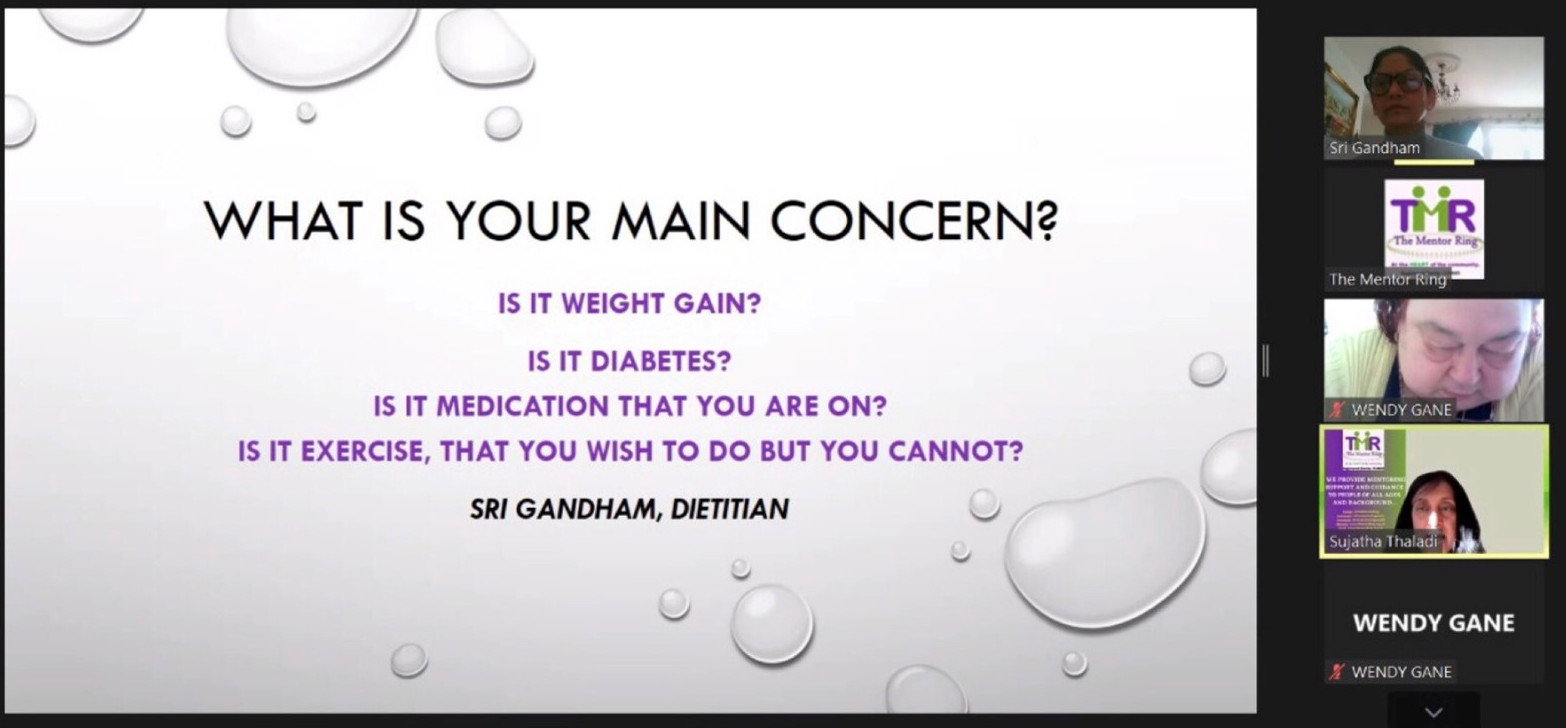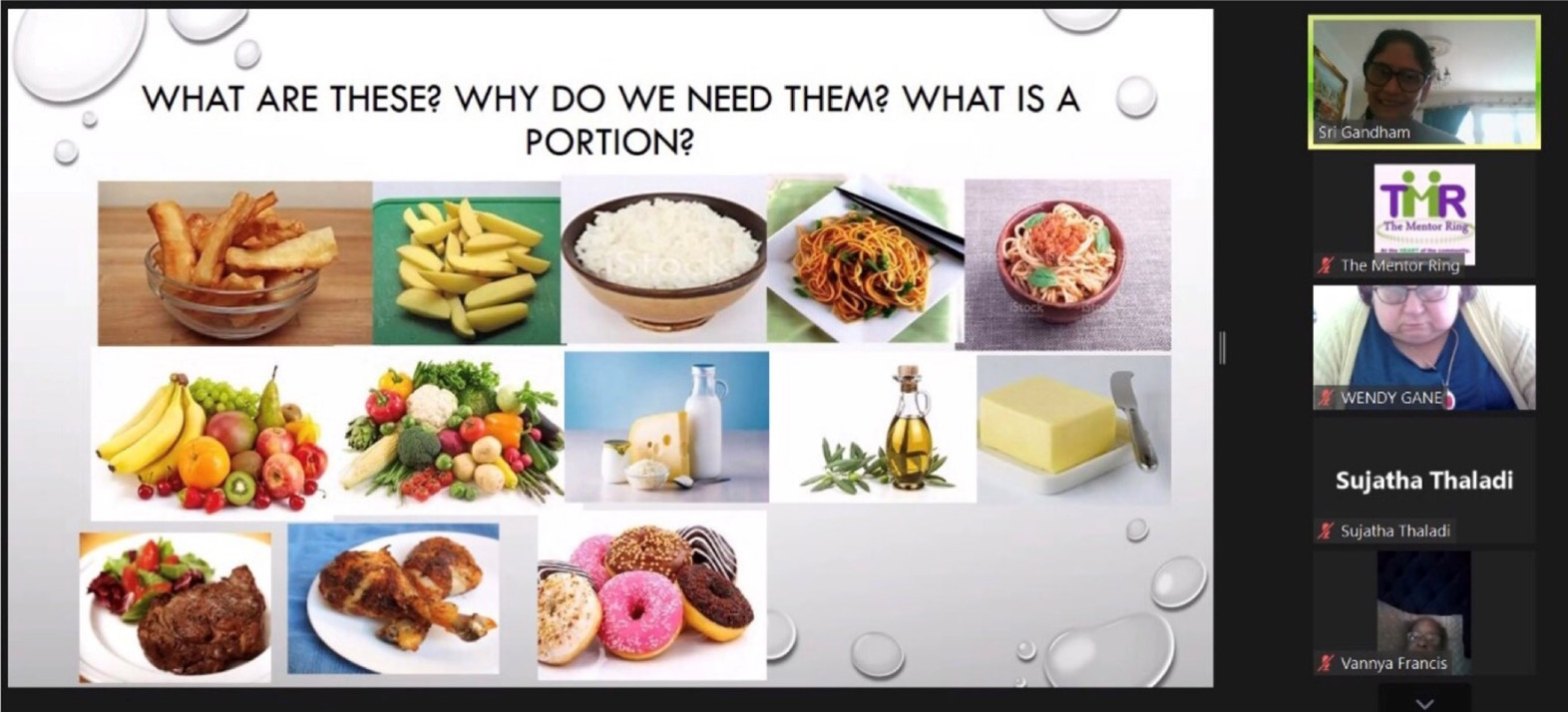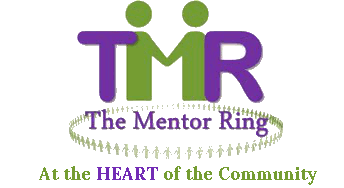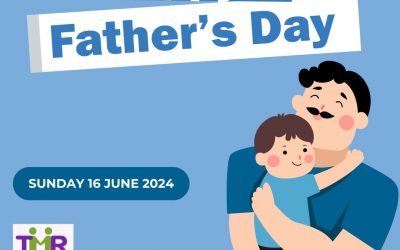On 14th November, The Mentor Ring held a Healthy Eating session hosted by Sri Gandham. Sri’s special interest is weight management. She is a dietician who deals with patients suffering from Diabetes. Sri discussed a range of topics related to Diabetes, healthy eating and losing weight. Firstly, she asked the following:
What is your main concern?:
- Is it weight gain?
- Is it Diabetes?
- Is it medication that you are on?
- Is it exercise that you wish to do but cannot?

Sri explained why gaining or losing weight is important for us to understand.
Insulin resistance is when insulin is not able to open our cells to insert the glucose. Once we gain weight, the cells get covered with fat, and the “key” to our insulin receptor no longer fits.
Type 2 Diabetics often ask, If I lose weight, will my Diabetes get better? The simple answer is yes. If you are taking medication for Type 2 Diabetes, it is possible to come off your medication if your Diabetes goes into remission. This is when your blood sugar levels fall into the non-diabetes range without any medication.
Many people ask, What is healthy eating?
The truth is, it’s all about calories and carbohydrates. There is no such thing as a “bad food”. You can eat what you want, as long as you know the correct portion size. Remember that even if you only eat fruit, you can still gain weight. The key is getting the right amount of calories and carbohydrates. Knowing your food groups will help. And count your calories (kcal). If you exceed the number of calories recommended, you will gain weight. Bodyweight is a balance between food and activity. Whatever we eat, we spend through physical activity.
If you dread exercise, change the phrase to “physical activity” or “being active”. Even walking around the house during the advert break of your television programme counts as physical activity or being active.

Here are some tips for healthy eating:
Potato chips cooked in a frying pan are high in calories because we add oil to them. Boiled potatoes are a healthier option.
Again, fried rice is high in calories because we add oil to it. Boiled rice is a better option.
Some fruits can be high in calories, especially if you exceed the recommended dose. A portion of fruit should be only 80 grams. If you eat more vegetables, they will help to fill you up. Most vegetables are lower in calories than fruit. However, it is still important to eat fruit. A good way to think is that your fruit and vegetables should contain as many of the colours of the rainbow as possible.
Fats, including cooking oils, butter, margarine, lard, cream and hard cheese have an average of 9 kcal per gram.
Protein, such as meats, fish, beans, soy and Quorn have an average of 4 kcal per gram.
Carbohydrates, such as starch and sugar have an average of 4 kcal per gram.
Alcohol has an average of 7 kcal per gram.
When reading a label on food packaging, note the following:
- Calories (kcal)
- Carbohydrates (Take note of the main number, NOT the number “of which sugars”)
- Salt
- Fat
Try changing your eating habits slowly. Change one thing at a time, and watch your eating habits evolve.
For example, you could start by changing from full-fat milk to semi-skimmed milk. And if you already drink semi-skimmed milk, you could try skimmed milk. But if you don’t like the taste of skimmed milk, you could try Arla Best of Both milk (BOB milk). It is lower in calories than semi-skimmed milk, but tastes just as good. Although, it is slightly more expensive.
Or, you could check your bread and work out the calories and carbohydrates per slice. Then, you could find a healthier option.
You could change the way you cook. Maybe you could add pulses or beans, use less oil, or even bake.
When it comes to snacks, these should be no more than 100 kcal, and the carbohydrates should be between 10 – 12. Be mindful that three digestive biscuits are equal to a 20-minute jog or a 40-minute walk. And a large doughnut can have as many as 400 calories.
Reduce salt (sodium) in your diet. Try using lemon juice, pepper or herbs as an alternative.
Drink 6 – 8 cups of fluid per day. A couple of these could be caffeinated, but most should be either plain water or sugar-free drinks.
Sri had some excellent advice for Goal setting:
1 With each small accomplishment comes great enthusiasm.
2 Goals are a preview of future events and experiences in your life. (Mark Victor Hansen)
3 The most important thing about goals is having one. (Geoffry Abert)
4 Believe you can, and you’re halfway there. (Theodore Roosevelt)
Finally, Sri reminded us to be positive and look for a solution. Here are some websites that may be useful:
www.diabetes.org.uk Search Diabetes UK. This website is good for learning more about Diabetes.
www.mydesmond.wales This website supports you in managing your Type 2 Diabetes.
www.nutrition.org.uk The British Nutrition Foundation is good for healthy eating and eating on a budget.
www.BHF.org.uk The British Heart Foundation has excellent information regarding eating on a budget.
www.nhs.uk The NHS website has a page called “20 tips to eat well for less”. To find this information on their site, simply type the above into their search feature.
With plenty of advice this session, there should be something for everyone to guide you on your way to a healthier lifestyle. Whether it be changing something you eat, visiting a new website for advice, or even memorising a quote to help you feel more positive, we hope you will feel more confident about being a healthier “you”.



